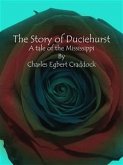“An old lady, in a high drawing-room, had had her chair moved close to the fire, where she sat knitting and warming her knees. She was dressed in deep mourning; her face had a faded nobleness, tempered, however, by the somewhat illiberal compression assumed by her lips in obedience to something that was passing in her mind. She was far from the lamp, but though her eyes were fixed upon her active needles she was not looking at them. What she really saw was quite another train of affairs. The room was spacious and dim; the thick London fog had oozed into it even through its superior defences. It was full of dusky, massive, valuable things. The old lady sat motionless save for the regularity of her clicking needles, which seemed as personal to her and as expressive as prolonged fingers. If she was thinking something out, she was thinking it thoroughly.” Henry James, OM, son of theologian Henry James Sr., brother of the philosopher and psychologist William James and diarist Alice James, was an American-born author, one of the founders and leaders of a school of realism in fiction. He spent much of his life in England and became a British subject shortly before his death. He is primarily known for a series of major novels in which he portrayed the encounter of America with Europe. His plots centered on personal relationships, the proper exercise of power in such relationships, and other moral questions. His method of writing from the point of view of a character within a tale allowed him to explore the phenomena of consciousness and perception, and his style in later works has been compared to impressionist painting.
Bitte wählen Sie Ihr Anliegen aus.
Rechnungen
Retourenschein anfordern
Bestellstatus
Storno









